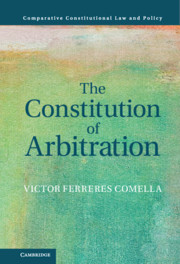Book contents
- The Constitution of Arbitration
- Comparative Constitutional Law and Policy
- The Constitution of Arbitration
- Copyright page
- Dedication
- Contents
- Acknowledgments
- Introduction
- Part I Arbitration and Private Law
- Part II Investment Treaty Arbitration
- Part III State-to-State Arbitration
- 10 The Arbitral Foundations of International Adjudication
- 11 The Virtues and Limitations of State-to-State Arbitration
- Afterword
- Index
10 - The Arbitral Foundations of International Adjudication
from Part III - State-to-State Arbitration
Published online by Cambridge University Press: 11 March 2021
- The Constitution of Arbitration
- Comparative Constitutional Law and Policy
- The Constitution of Arbitration
- Copyright page
- Dedication
- Contents
- Acknowledgments
- Introduction
- Part I Arbitration and Private Law
- Part II Investment Treaty Arbitration
- Part III State-to-State Arbitration
- 10 The Arbitral Foundations of International Adjudication
- 11 The Virtues and Limitations of State-to-State Arbitration
- Afterword
- Index
Summary
When states are involved in a dispute in the international sphere, they can take different paths to resolve it in a peaceful way. Among other things, they can resort to arbitration or they can send the case to an international court. Arbitration played an important part in the early stages of international law, before permanent courts were created in the twentieth century. International adjudication, however, retains its arbitral foundation, since the consent of the contending states is always necessary for a court to have jurisdiction to settle a dispute. The chapter criticizes the consent theory and the conception of state sovereignty that has impeded the formation of courts endowed with compulsory jurisdiction. The international legal order is constitutionally defective when it comes to its adjudicative structures.
Keywords
- Type
- Chapter
- Information
- The Constitution of Arbitration , pp. 179 - 195Publisher: Cambridge University PressPrint publication year: 2021



